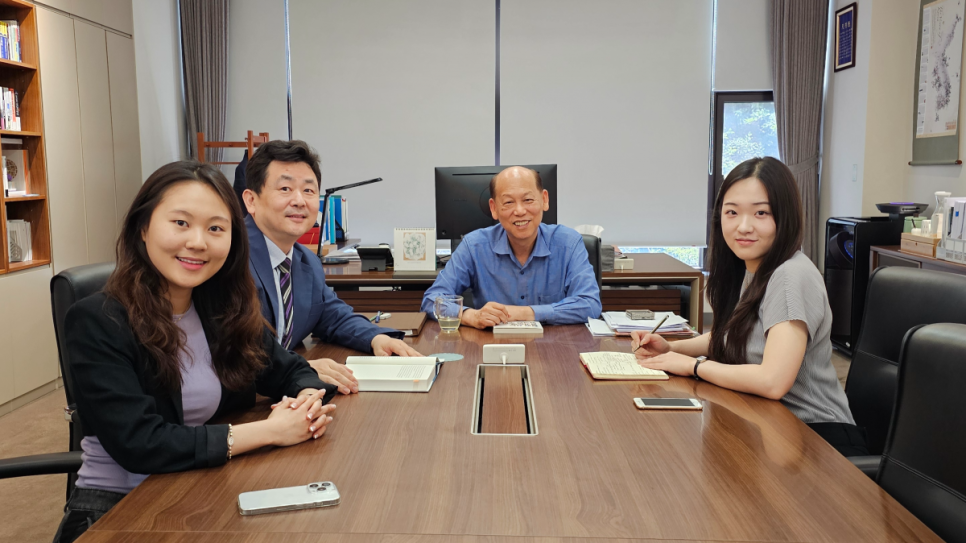
Cyber Diplomacy Organization VANK and the Korea Culture Foundation held a joint policy briefing at the foundation’s meeting room in Yangjae-dong, Seocho District, Seoul, focusing on Korea’s national identity and future vision. The discussion centered on history, fair society, and cultural policy directions.
The meeting highlighted three key agendas: strengthening history education with a focus on the modern era, implementing a digital-based fair society, and promoting the philosophical depth and future value of the Korean language. VANK plans to develop these discussions into concrete policy proposals through the citizen-participatory platform “Woollim” and the national policy communication platform “Yeollim.”
Kim Joon-il, chairman of the Korea Culture Foundation, emphasized that true national development stems not from superficial growth but from establishing solid social foundations. He criticized the current education system for neglecting history, arguing that students should focus on understanding Korea’s modern historical struggles, including the loss of sovereignty in late Joseon and the Japanese colonial period, rather than merely memorizing names of ancient kings.
“Understanding modern history is essential to interpreting contemporary diplomatic, security, and territorial issues,” Kim said. “For example, calls such as ‘Dokdo is our territory’ gain legitimacy only within the proper historical context. Setting clear standards for historical interpretation is the first step toward shaping the country we aspire to build.”
Kim also warned about the erosion of social trust caused by AI-generated content, phishing scams, and the spread of fake news. “VANK’s experience in correcting distortions about Korea abroad should now be applied to building a fair digital society domestically,” he said. He proposed creating a civil-led reporting platform for fake news and phishing, supported by government agencies and telecom platforms, alongside campaigns to strengthen digital literacy among youth to resist algorithm-driven misinformation.
He stressed the importance of allowing users to control algorithmic content and called for government-level regulatory frameworks. “The ability to discern information’s veracity is a core civic competency in the digital age and the foundation of a healthy democracy,” Kim added.
The discussion also addressed the philosophical depth and global potential of Korean and Hangeul. Kim described Homer Hulbert as the foreign pioneer who first introduced Hangeul’s unique qualities to the world. He highlighted that Korean possesses rich onomatopoeia and mimetic expressions, which Hangeul captures in a logical yet intuitive writing system.
“Language inherently contains ambiguity, which can cause misunderstandings or conflict. Korean and Hangeul, however, provide a unique tool to bridge these gaps, extending human communication beyond conventional limits,” Kim explained. He added that Hulbert’s legacy illustrates the importance of preserving and promoting the philosophical and cultural value of Hangeul in the modern era.
Following the briefing, VANK announced plans to translate the discussions into concrete proposals through Woollim and Yeollim. Key initiatives include expanding history education focused on the modern era, enhancing policies on digital literacy and misinformation, and launching campaigns to highlight the philosophical and global value of Hangeul.
Park Ki-tae, Head of VANK, said, “Fairness and justice must be grounded in history and social trust. This briefing provided an opportunity to discuss strategies for building that foundation.” He added that VANK aims to connect its global experience in promoting Korea’s identity with domestic policy initiatives, ensuring citizens’ voices contribute to meaningful change.
VANK researchers also shared recommendations for implementing these policies. Koo Seung-hyun proposed recognizing the contributions of individual Koreans to the nation’s development through campaigns and awards, while Gu Seung-hyun emphasized promoting Hangeul’s philosophical value worldwide in line with Hulbert’s legacy.
Kim Joon-il concluded, “Expanding public understanding of Korea’s history, fostering a fair digital society, and promoting the unique value of Korean and Hangeul are essential for the nation’s sustainable future. We look forward to translating today’s discussions into actionable policies that strengthen national identity and global cultural presence.”